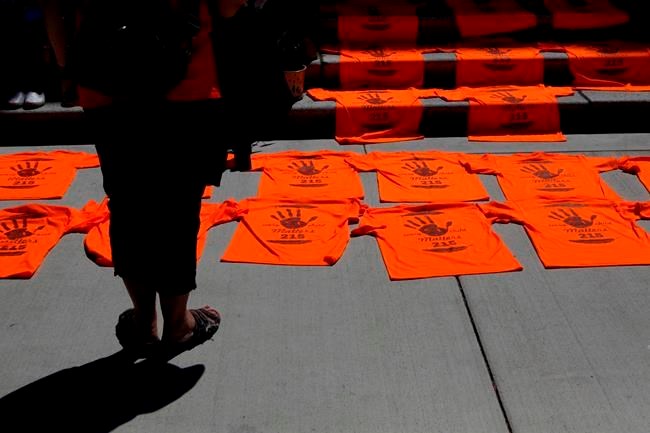CRANBROOK, B.C. — Two First Nations say a search using ground-penetrating radar has found the remains of 182 people in unmarked graves at a site close to a former residential school in the southern Interior of British Columbia.
But the leadership of the Ktunaxa community of aq'am says several factors make it difficult to establish whether the unmarked graves contain the remains of children who attended the institution.
The Lower Kootenay Band, another Ktunaxa community in B.C.'s southern Interior, released a statement earlier today saying ground-penetrating radar had detected the remains near the site of the former St. Eugene's Mission School.
The statement from aq'am says the history of the area is complex and analysis of the findings is ongoing, with preliminary results finding 182 unmarked graves, some as shallow as 90 centimetres, in a cemetery next to the institution.
It says the cemetery was established around 1865 for settlers to the area and many of those buried there died at a nearby hospital that burned down in 1899.
The statement from aq'am says hundreds of Ktunaxa children and those from neighbouring Indigenous nations attended the residential institution that was operated by the Catholic Church from 1912 to 1970.
It says graves were traditionally marked with wooden crosses that could have been destroyed or deteriorated over time, presenting a challenge in identifying whether they contain the remains of children who were at the school.
The leadership of the aq'am First Nation decided to use ground-penetrating radar technology at the site after an unknown and unmarked grave was found last year, it says.
"This was a deeply disturbing and painful experience for our elders and community as a whole," the statement says. "Ktunaxa cultural protocols were strictly followed by (aq'am) community members who participated in the process as well as the contractor who operated the ground-penetrating radar system."
There will be further ground-penetrating radar work at the site near the building, which is now home to the St. Eugene golf resort and casino, it says.
The resort is owned and operated by a partnership comprised of aq'am, the Lower Kootenay Band and three other Ktunaxa nations, and the process to establish it took "10 incredibly difficult years," a page on its website says. It started with family visits and two years of engagement with more than 1,500 members of the five bands that share the reserve lands it was built on. Finally, it says, all bands voted in favour of restoration in a referendum.
Sophie Pierre, the chairwoman of the resort's board and a former chief of the Ktunaxa, said what was found is in a gravesite that is still used to this day and the discovery was not unexpected.
Pierre, who attended the school, said she's worried about how it will affect the resort, which opened in the early 2000s after years of negotiation. She added that a lot of work has gone into reclaiming the residential school site and turning into a resort complex.
"We have listened to our elders and have taken back what was taken away from us," she said, referring to the decision to turn the school into a hotel.
Cowessess First Nation last week announced ground-penetrating radar had detected 751 unmarked graves at the former Marieval Indian Residential School east of Regina, a few weeks after what are believed to be the remains of 215 children were found at a former residential school in Kamloops, B.C.
The B.C. government is providing $12 million to support First Nations doing investigative work at former residential institutions and for programs to help community members experiencing trauma after the recent findings.
The province said this week it's working with a number of nations that have requested assistance in determining next steps for searching the sites. Those nations include the Tk'emlúps te Secwépemc in Kamloops and the Daylu Dena Council in Lower Post, where a former residential school is being demolished.
The Indian Residential Schools Resolution Health Support Program has a hotline to help residential school survivors and their relatives suffering trauma invoked by the recall of past abuse. The number is 1-866-925-4419.
This report by The Canadian Press was first published June 30, 2021.
The Canadian Press



